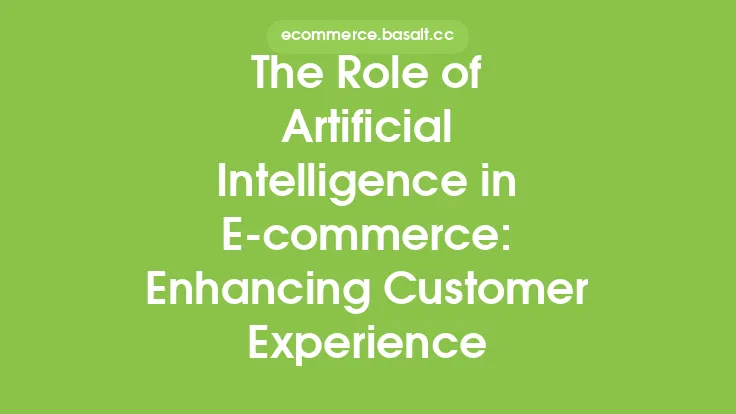The e-commerce industry has undergone significant transformations over the years, driven by advances in technology and changing consumer behaviors. One of the key drivers of this transformation is artificial intelligence (AI), which is revolutionizing the way online businesses operate, interact with customers, and drive sales. AI is being used in various aspects of e-commerce, from personalized product recommendations to automated customer service, and its impact is being felt across the entire value chain.
Introduction to Artificial Intelligence in E-commerce
Artificial intelligence refers to the use of computer algorithms and machine learning techniques to analyze data, identify patterns, and make decisions. In the context of e-commerce, AI can be used to analyze customer data, such as browsing history, search queries, and purchase behavior, to provide personalized recommendations, improve customer service, and optimize business operations. AI-powered systems can also be used to automate tasks, such as data entry, inventory management, and order fulfillment, freeing up human resources to focus on higher-value tasks.
Applications of Artificial Intelligence in E-commerce
There are several applications of AI in e-commerce, including:
- Product Recommendations: AI-powered systems can analyze customer data and behavior to provide personalized product recommendations, increasing the likelihood of sales and improving customer satisfaction.
- Chatbots and Virtual Assistants: AI-powered chatbots and virtual assistants can be used to provide automated customer service, answering frequently asked questions, and helping customers with their queries.
- Predictive Analytics: AI-powered predictive analytics can be used to forecast demand, identify trends, and optimize pricing and inventory management.
- Image Recognition: AI-powered image recognition can be used to improve product search, allowing customers to search for products using images rather than text.
- Natural Language Processing: AI-powered natural language processing can be used to improve customer service, allowing customers to interact with chatbots and virtual assistants using natural language.
Benefits of Artificial Intelligence in E-commerce
The use of AI in e-commerce offers several benefits, including:
- Improved Customer Experience: AI-powered systems can provide personalized recommendations, improving the customer experience and increasing the likelihood of sales.
- Increased Efficiency: AI-powered systems can automate tasks, such as data entry and inventory management, freeing up human resources to focus on higher-value tasks.
- Enhanced Decision-Making: AI-powered predictive analytics can provide insights into customer behavior and market trends, enabling businesses to make informed decisions.
- Competitive Advantage: Businesses that adopt AI-powered systems can gain a competitive advantage over those that do not, improving their ability to attract and retain customers.
Challenges and Limitations of Artificial Intelligence in E-commerce
While AI offers several benefits in e-commerce, there are also several challenges and limitations to its adoption, including:
- Data Quality: AI-powered systems require high-quality data to function effectively, and poor data quality can lead to inaccurate insights and decisions.
- Complexity: AI-powered systems can be complex and difficult to implement, requiring significant investment in technology and expertise.
- Transparency: AI-powered systems can be opaque, making it difficult for businesses to understand how decisions are being made and to identify biases.
- Regulation: The use of AI in e-commerce is subject to regulation, and businesses must ensure that they comply with relevant laws and regulations, such as those related to data protection and consumer rights.
Future of Artificial Intelligence in E-commerce
The future of AI in e-commerce is exciting and rapidly evolving. As technology advances, we can expect to see even more sophisticated AI-powered systems, such as:
- Autonomous Systems: Autonomous systems that can operate independently, making decisions and taking actions without human intervention.
- Explainable AI: Explainable AI systems that can provide transparent and interpretable insights into decision-making processes.
- Human-AI Collaboration: Human-AI collaboration systems that enable humans and AI systems to work together, leveraging the strengths of both to drive business success.
- Edge AI: Edge AI systems that can operate at the edge of the network, reducing latency and improving real-time decision-making.
Best Practices for Implementing Artificial Intelligence in E-commerce
To implement AI effectively in e-commerce, businesses should follow several best practices, including:
- Start Small: Start with small, focused projects, and scale up gradually as experience and expertise are gained.
- Invest in Data Quality: Invest in high-quality data, and ensure that data is accurate, complete, and consistent.
- Develop a Clear Strategy: Develop a clear strategy for AI adoption, aligning with business goals and objectives.
- Build a Skilled Team: Build a skilled team with expertise in AI, data science, and e-commerce.
- Monitor and Evaluate: Monitor and evaluate AI-powered systems regularly, ensuring that they are operating effectively and efficiently.





